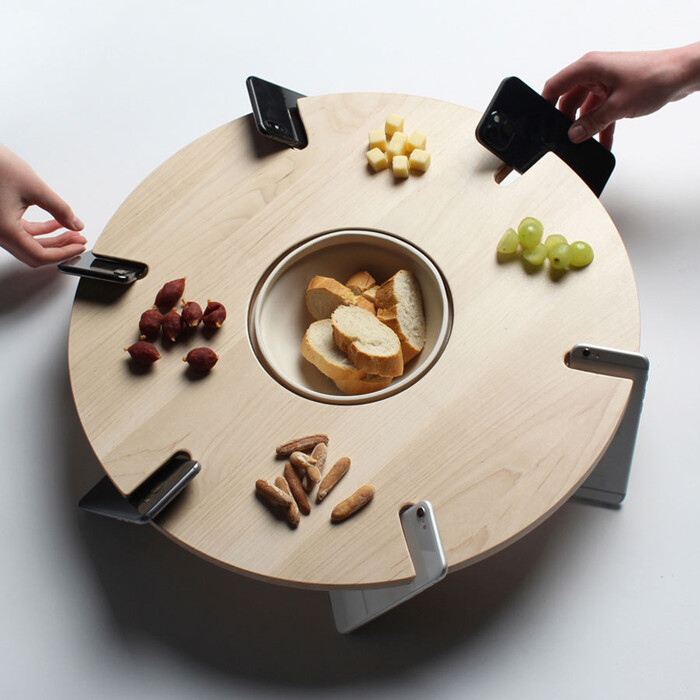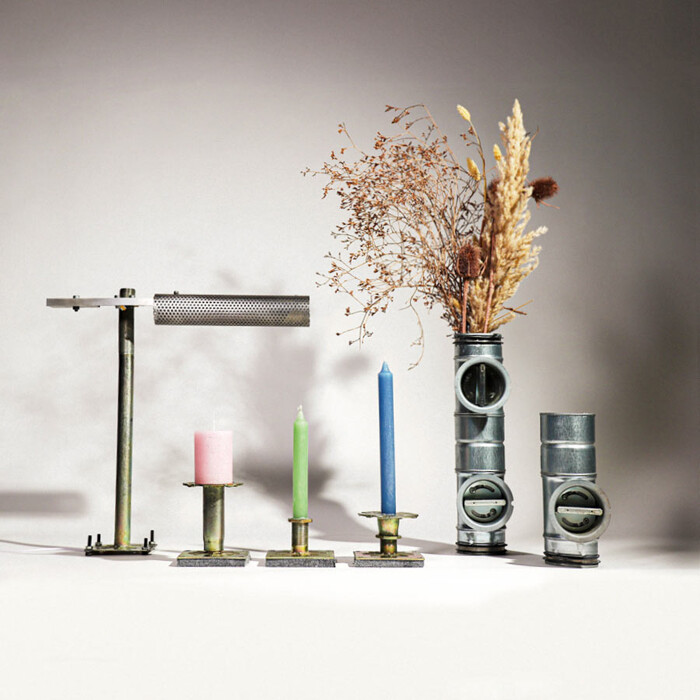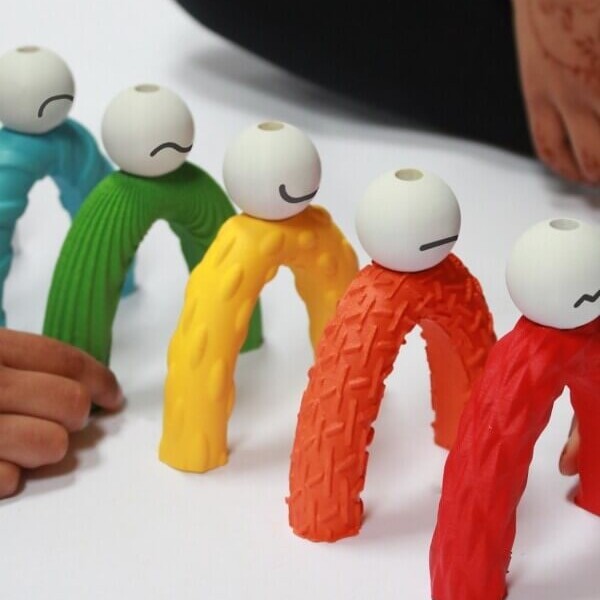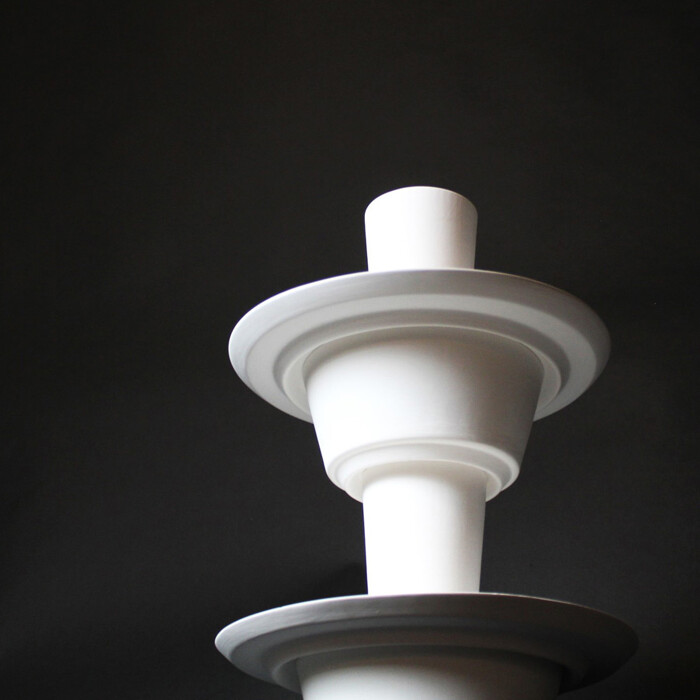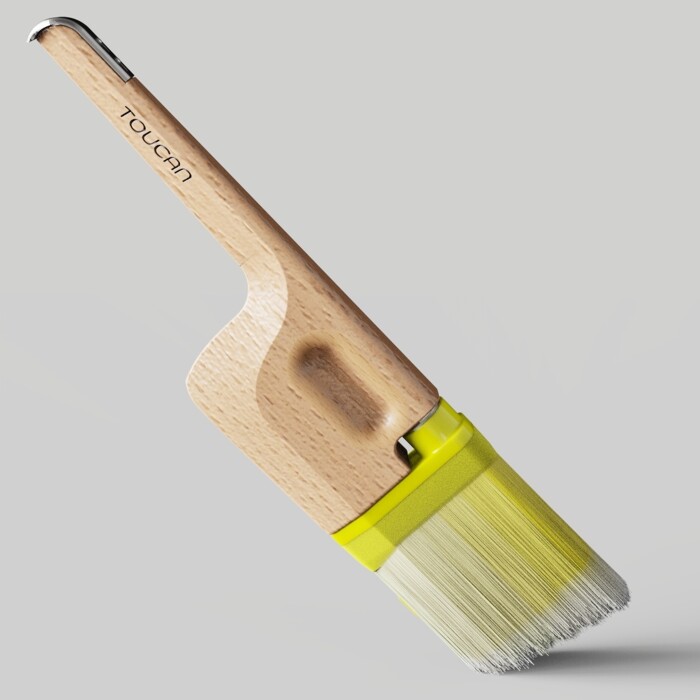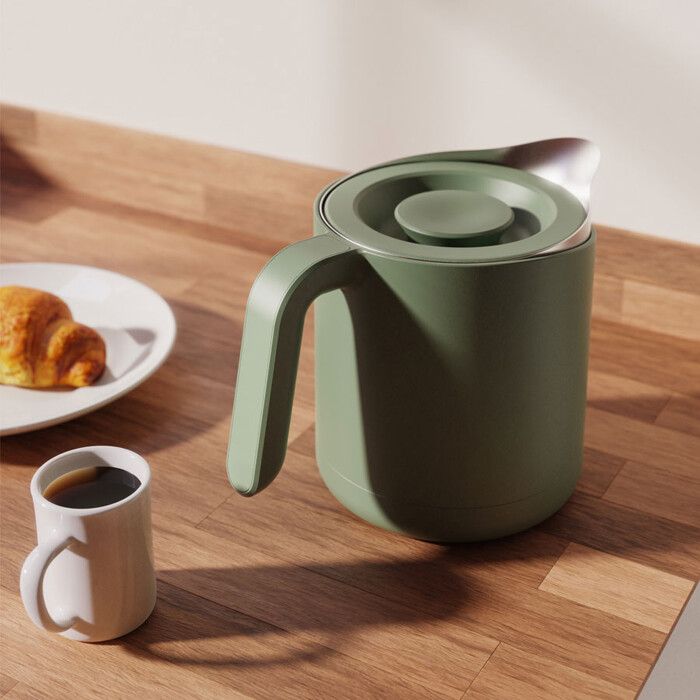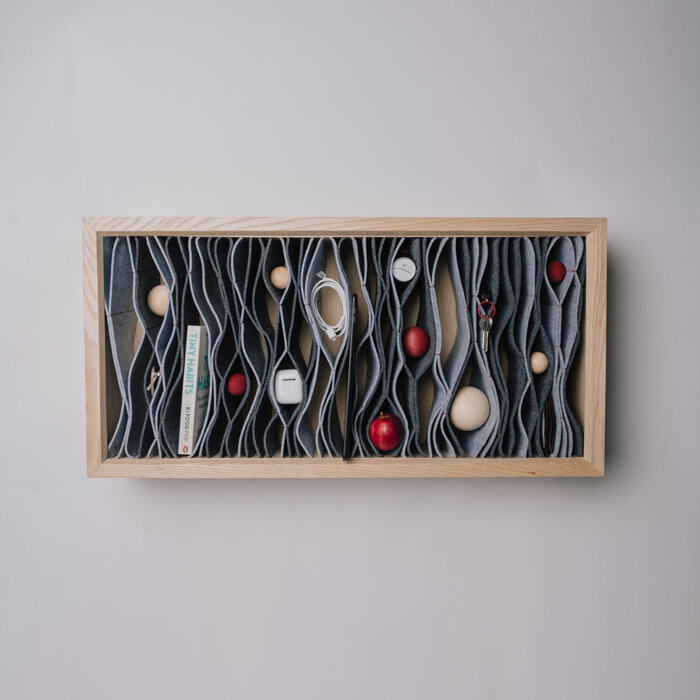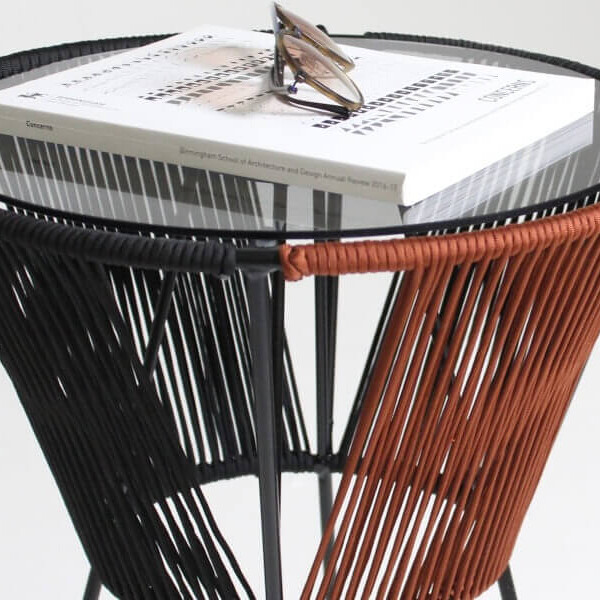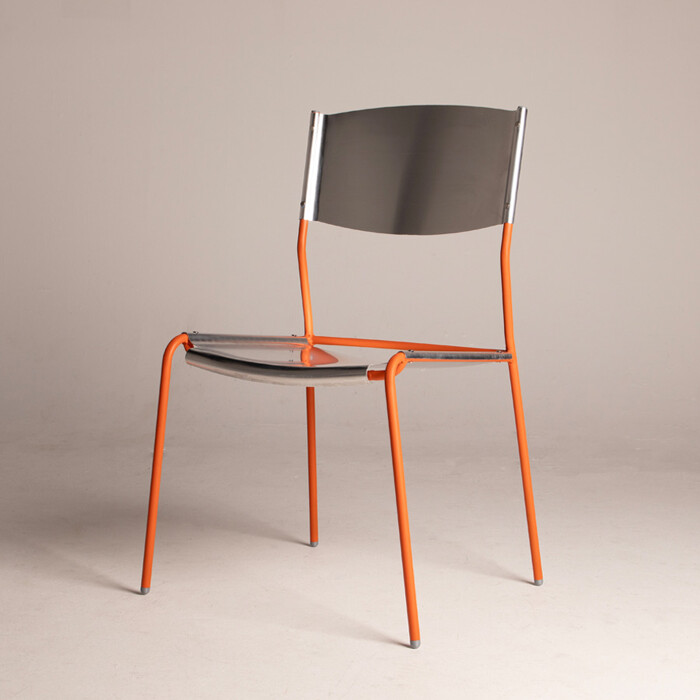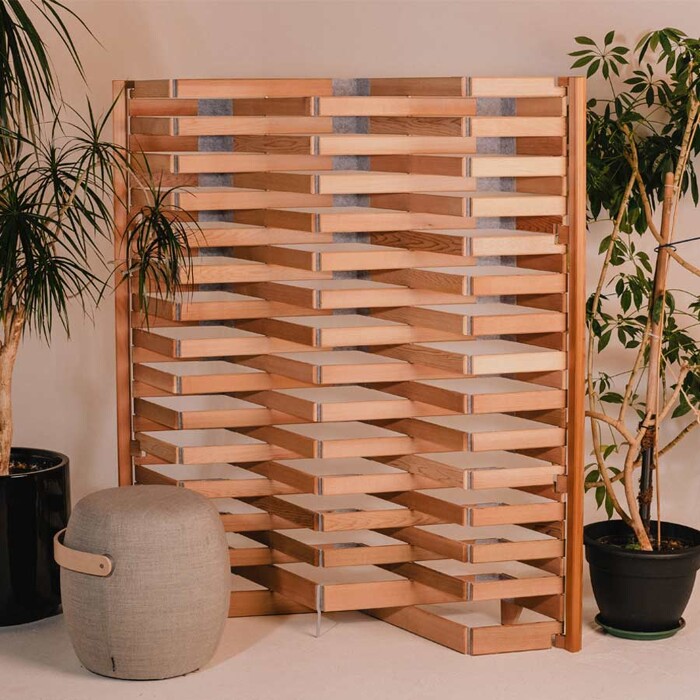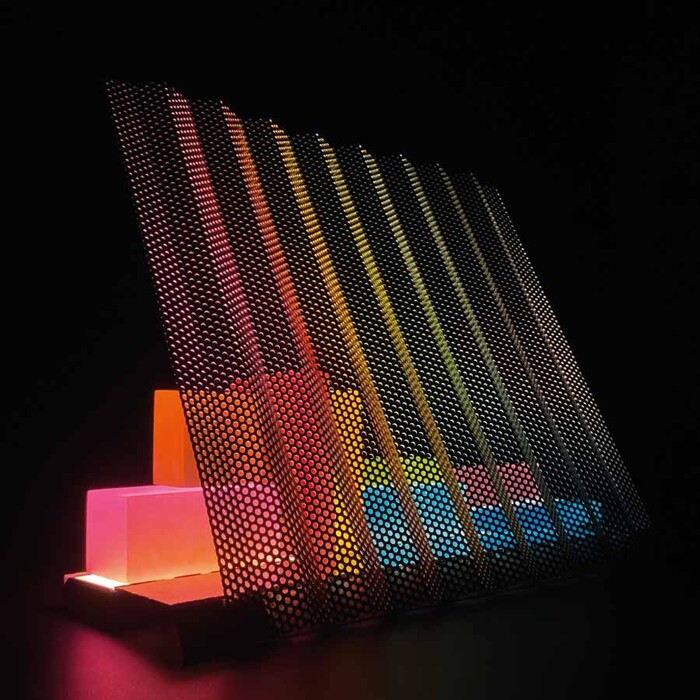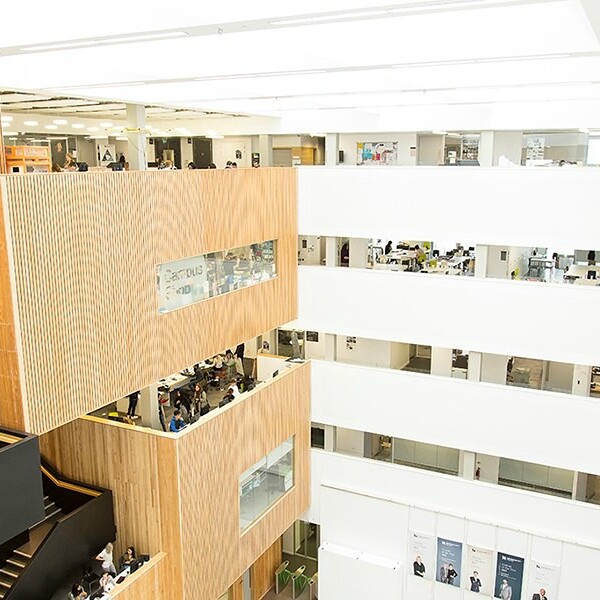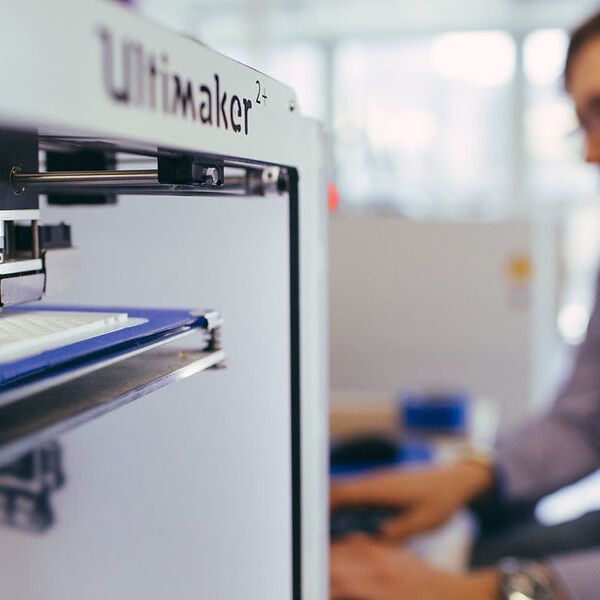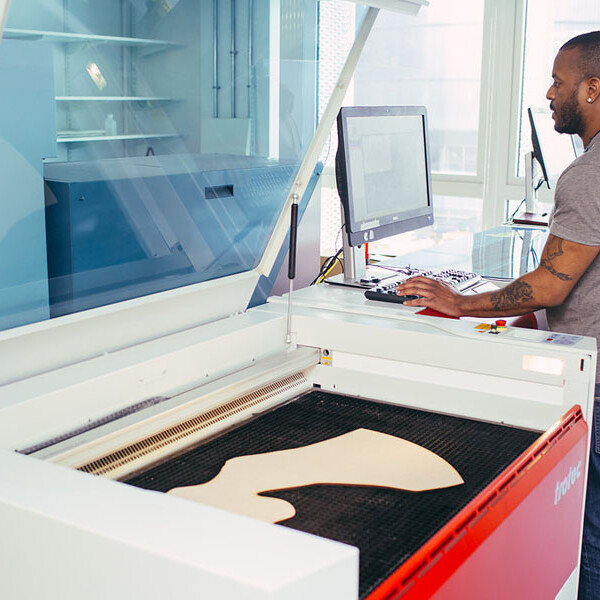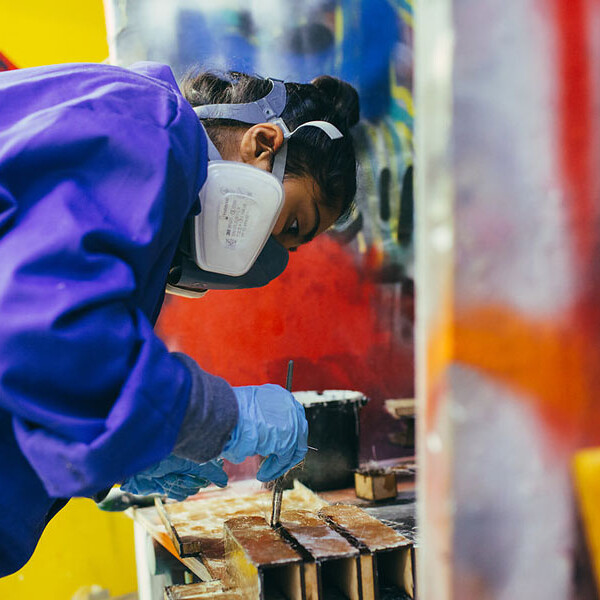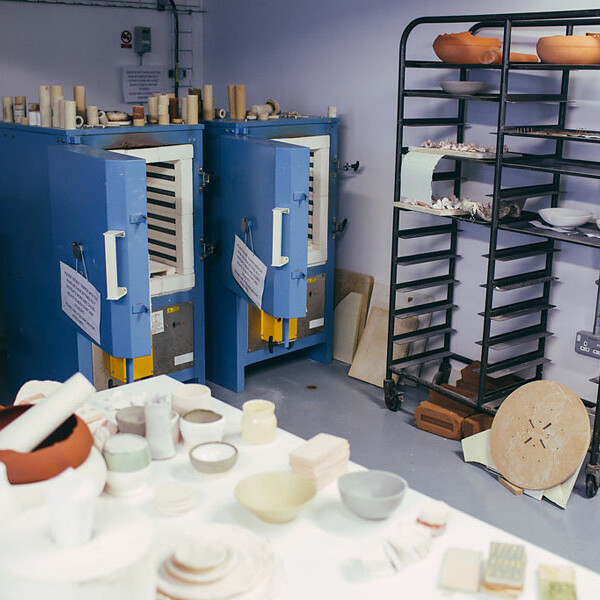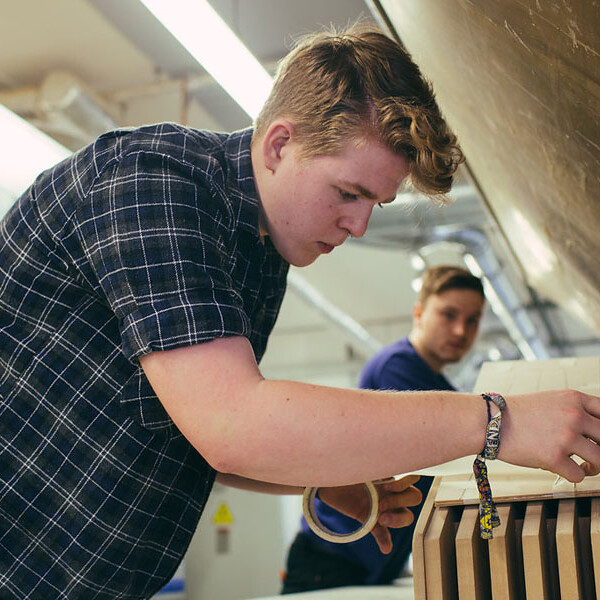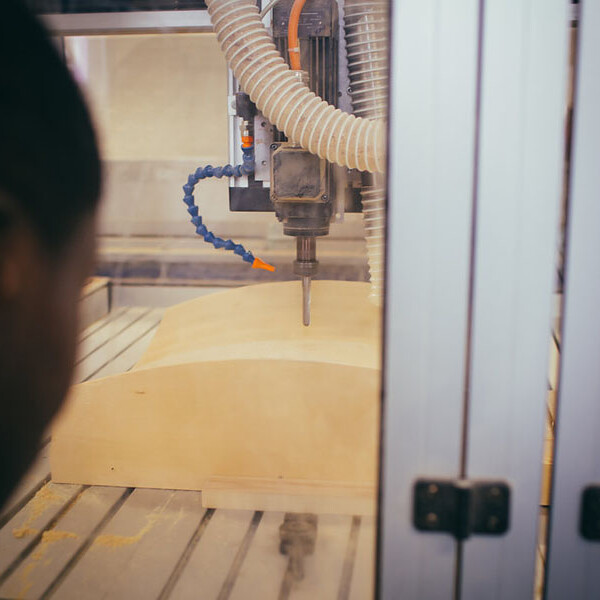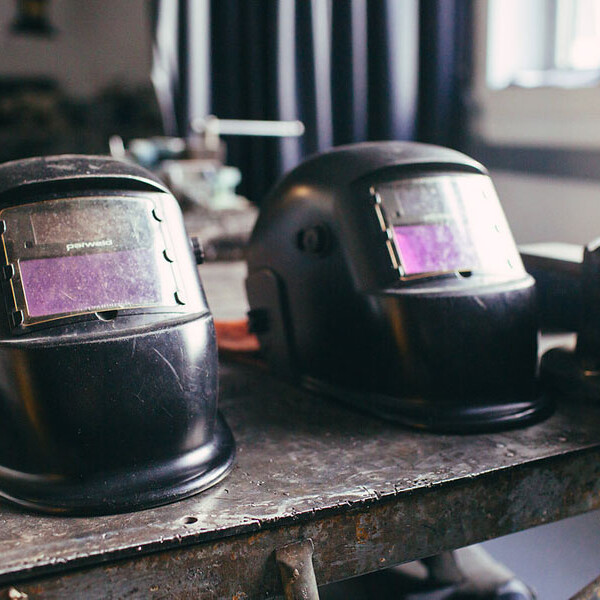Product Design with a Foundation Year - BA (Hons)
Currently viewing course to start in 2025/26 Entry.
This Foundation Year has been specifically designed to allow you to undertake an additional year of study to build stronger creative footings that ensure successful progression through your chosen degree....
- Level Foundation
- Study mode Full Time
- Award BA (Hons)
- Start date September 2025
- Fees View course fees
- Subject
- Location Margaret Street
This course is:
Open to International Students
Overview
This Foundation Year has been specifically designed to allow you to undertake an additional year of study to build stronger creative footings that ensure successful progression through your chosen degree.
Working in a friendly, lively and energetic environment, you will be given the freedom to expand your knowledge of practical skills, creative exploration and conceptual thinking, underpinned by broad critical understanding, academic writing and emerging theoretical principles.
Dedicated Foundation tutors, BA staff and experienced technicians will support you throughout the year and work closely with you to prepare you for progression. There will be a range of opportunities to work on collaborative and individual projects, aimed to build your social skills and identify your role as a developing practitioner.
Throughout the year you will be challenged with projects that question your current creative experiences and explore a breadth of experimentation to broaden your technical and critical understanding.
You will be encouraged to analyse methods and materials appropriate for creative development and to question your position in relation to historical, contemporary and future world scenarios. Both practical and written research tasks will be supported by one to one tutorials and small discussion groups to help you constructively build academic and social confidence.
The two first semester modules will form the building blocks for future work and will explore core principles of creative practice focussing on the development of technical confidence, study skills and productivity. The two final semester modules will encourage a positive integration between research and practice, challenging decision making and technical competency. This semester is designed to empower you with independent learning skills appropriate for your future BA studies.
On successful completion of the Foundation Year, you will have the flexibility to change direction and switch courses onto a related undergraduate degree programme within the College of Art and Design or the College of Digital Arts at BCU. In order to progress onto your BA Programme, you must successfully pass all four core modules (totalling 120 credits).
What's covered in this course?
You will examine the process of designing and developing functional, inclusive, and sustainable products and furniture, understanding how social and cultural factors influence design decisions. You will develop knowledge of design in response to collaborative, professional, commercial, and economic considerations.
Alongside research and design development skills, you will increase your practical knowledge through extensive hands-on exploration. Engaging with making from the outset enables you to fully realise design concepts and create convincing models and prototypes. With strong contemporary design thinking, you will explore various ‘scales of manufacture’ to position yourself within a global industry.
By working on live projects, work placements and collaborative projects, you will learn how businesses operate at a commercial, technological, ethical, and sustainable level.
Furniture Design specialism
All students will be introduced to core modules exploring the fundamentals of designing products and furniture. You will have the opportunity to focus exclusively on Furniture Design from semester 2 of your second year, starting with the Design Focus module, before specialising further in your final year.
If you choose to specialise in Furniture Design, you will cover the same curriculum but opt for furniture-related project briefs. This option will suit those students who wish to develop and enhance their making skills through the design, development and production of furniture and related products. You will be able to explore furniture design across various production scales, from bespoke to mass manufacture. You will graduate with BA (Hons) Product Design (Furniture Design).
I would highly recommend this course to anyone looking to study design. The facilities are incredible and the tutors are really supportive and helpful. I have learnt so much and developed as a designer more than I expected to. Thanks to this course, I was able to win the Made.com award at New Designers which was an incredible experience. I was also shortlisted for 3 other awards too! Throughout New Designers I was approached by several companies who were hiring and interested in seeing my portfolio. Fortunately I secured a job before the end of final year as a Product Designer for Foresso. I really love my job and I'm so grateful to BCU for providing me with the skills I needed for the industry.
Graduate - Aamana Bibi Nawaz (Winner – New Designers 2022 – MADE.COM Collaboration Award), Designer at Habitat
Why Choose Us?
- Live projects and industrial collaborations provide you with invaluable real-world experiences and hone your communication and professional development skills.
- You will develop practical skills through extensive workshop practice within our Ceramics, Plaster, Wood and Metal workshops.
- From water jet cutting, to 3D printing, you will develop skills in rapid prototyping and digitally driven techniques.
- The course has achieved notable success in design events, securing major awards and commendations at New Designers and the Young Furniture Makers Exhibition.
- Two-thirds of the impact of our research was judged to be very considerable (3*) or outstanding (4*) - REF2021.
Open Days
Join us for an Open Day where you'll be able to learn about this course in detail, chat to students, explore our campus and tour accommodation. Booking isn't open for this event yet, register your interest and we'll let you know as soon as booking goes live.
Next Open Day: 28 June 2025
Entry Requirements
These entry requirements apply for entry in 2025/26.
All required qualifications/grades must have been achieved and evidenced at the earliest opportunity after accepting an offer to help confirm admission and allow for on-time enrolment. This can also include other requirements, like a fee status form and relevant documents. Applicants can track their application and outstanding information requests through their BCU mySRS account.
Essential requirements
80 UCAS Tariff points. Learn more about UCAS Tariff points.
If you have a qualification that is not listed, please contact us.
Fees & How to Apply
UK students
Annual and modular tuition fees shown are applicable to the first year of study. The University reserves the right to increase fees for subsequent years of study in line with increases in inflation (capped at 5%) or to reflect changes in Government funding policies or changes agreed by Parliament. View fees for continuing students.
Award: BA (Hons)
Starting: Sep 2025
- Mode
- Duration
- Fees
- Full Time
- 4 years
- £9,535 in 2025/26 ✱ Important note for this price
- Apply via UCAS
(↩Back to price) * The Government is proposing to increase the cap on full-time regulated tuition fees to £9,535 for 2025/26 and the University is planning on increasing fees to that maximum level once legislation is enacted. Part-time fees are charged pro-rata, where applicable.
International students
Annual and modular tuition fees shown are applicable to the first year of study. The University reserves the right to increase fees for subsequent years of study in line with increases in inflation (capped at 5%) or to reflect changes in Government funding policies or changes agreed by Parliament. View fees for continuing students.
Award: BA (Hons)
Starting: Sep 2025
- Mode
- Duration
- Fees
- Full Time
- 4 years
- £17,690 in 2025/26
Guidance for UK students
UK students applying for most undergraduate degree courses in the UK will need to apply through UCAS.
The Universities and Colleges Admissions Service (UCAS) is a UK organisation responsible for managing applications to university and college.
Applying through UCAS
- Register with UCAS
- Login to UCAS and complete your details
- Select your course and write a personal statement
- Get a reference
- Pay your application fee and submit your application
You are not required to submit a portfolio for this course.
Course in Depth
Foundation year
The foundation year provides an opportunity to explore the exciting world of contemporary design through various scales and develop creative solutions, encapsulating Landscape Architecture, Architecture, Interior Architecture and Design, and Product Design.
It provides a supported learning environment to explore conceptual ideas through to detailed design, mapping and modelling and is assessed through mini design-focussed projects and a specialised final project in a chosen field.
The foundation year is ideally suited to students who need to develop their design, drawing, technical and presentations skills before entering a BA course, or for those who have not yet decided which specific design discipline or career to pursue.
In order to complete this course, you must successfully complete all the following CORE modules (totalling 120 credits):
This module explores the term ‘practice’ as the process of making, developing and recording information. We will work with you to explore the development of your work based on a set project, looking at a number of documentation strategies while experimenting with a broad range of materials. You will have the opportunity to meet artists and practitioners through local gallery visits and in studio activities and will learn to analyse your work through tutorials and small group discussions.
Artists work in a globally influenced, culturally diverse, and technologically advancing world.
Their art is a dynamic combination of materials, methods, concepts, and subjects that challenge traditional boundaries and defy easy definition.
This module will look at experimental approaches to drawing to identify radical new solutions from the perspective of the contemporary world we live in.
Your brief is to apply the process of ‘rework’ to found imagery, object/s and or photographs
During this module you will meet lecturers, researchers and partners from across BCU, the city and further afield to open your understanding of practiced based creative work.
Through lectures and workshops, you will be introduced to the versatility of subject areas in terms of ideas, development, research, materials, techniques and contexts.
You will also be introduced to critical thinking seminars and workshops alongside group discussion and individual tutorials.
Creative realisation is not just about the practice of producing creative responses, it is about identifying the factors that generate creative thinking and facilitating the process.
For this module you will draw on your own creative strategies to facilitate the development of a project that is appropriate for progression onto your chosen BA (Hons) course.
To identify the focus for your project you must research ‘Future Horizons’ from the rapidly changing world around you - anything that reflects new innovations, e.g. seismic changes, space travel, war, social conflict, internationalisation, environment, technology, architecture, bio-art etc. – whether great or small.
Year one
First-year modules introduce key principles, processes and methods.
Modules include:
In order to complete this course you must successfully complete all the following CORE modules (totalling 120 credits):
Studio and workshop based activities will introduce you to a range of fundamental design principles to broaden and improve your knowledge and understanding of the design process. You will explore a variety of issues, guidelines and general design considerations that are relevant for designers.
The module introduces you to some of the critically defining key events and precedents that have influenced and shaped historical and contemporary design. This module engages with the key design ideologies of the 20th and 21st Century, developing an understanding of the principles of design analysis, critical analysis, academic writing, questioning and debate.
This module introduces students to fundamental elements and key methodologies of visual expression and communication. Through drawing and image building assignments, students will develop a comprehensive range of 2D and 3D skills in order to develop a visual language to respond effectively and creatively to design tasks and formal briefs.
The design process relies on a rich understanding of the nature of materials; their physical properties, inherent qualities, and how they can be manipulated (processed). This module seeks to embed an understanding of material and process technologies that will enable you to design with specific parameters in mind and appreciate the limitations of what you are designing with. This will encourage you to embrace material qualities as part of the design process, and actively explore the creative application of current and future technologies.
This module will introduce basic principles and considerations when designing for various scales of manufacture, helping you to develop an awareness of the impact of economies of scale on design thinking. The module will introduce fundamental strategies in designing for different markets and you will explore the relationships between scale, context and implementation.
Year two
Employability-focused modules during your second year year enhance industry knowledge and experience.
In order to complete this course you must successfully complete all the following CORE modules (totalling 100 credits)
Modules include:
The main focus of this module is to enable you to develop more advanced CAD skills (SolidWorks) and use these in relation to the design process. As your skills develop you will be expected to utilise and correctly synthesise the SolidWorks program in line with industry recognised production methods and techniques. This will enable you to develop and realise designed concepts using digital technologies and to effectively communicate design intentions within the context of manufacturing and industry.
This module will apply the ‘user-needs’ design philosophy as a framework to enable you to build upon and synthesise core design skills introduced at level 4 of the programme.
Design Synthesis will engage our students in the appropriate observational and analytical approaches required to develop user-centred design outcomes. The module will address the philosophy behind human-centred design and will encourage you to develop your own reasoning by putting the ‘needs and requirements’ of the ‘person/client/user’ at the centre of the process.
This module will give you the opportunity to ‘focus’ your studies through self-directed practice, researching a personal area of interest and creating outcomes that reflect your developing knowledge of Product and Furniture Design. This gives a guided introduction to the largely self-initiated study you will experience in level 6.
In order to complete this course, you must successfully complete at least 20 credits from the following list of OPTIONAL modules.
The purpose of this module is to enable you to develop professional attributes and subject skills through experience in the work place, and to critically reflect upon your learning in that context. You will normally be expected to arrange your own placement, with support from academic staff and ADM Careers+.
This module provides an opportunity for you to apply your knowledge and skills to an external, professional brief. The brief will be set by an external client/ agency, in consultation with your supervisor, and it could be a ‘real life’ problem to be solved, or a simulation. It is an opportunity for you to engage in a professional manner with an aspect of your subject area, which contributes to the development of employability skills within the supportive infrastructure of the University. Where appropriate, the project may involve interdisciplinary collaboration with students from other courses. In this way, it reflects the collaborative, flexible nature of employment within the Creative Industries.
Core modules are guaranteed to run. Optional modules will vary from year to year and the published list is indicative only.
Year three
Modules in your final year encourage individual direction through live projects/competition and a self-written major design project.
In order to complete this course you must successfully complete all the following CORE modules (totalling 120 credits)
Modules include:
This module seeks to familiarise you with the initial stages of client contact in terms of responding to a brief and analysing an opportunity/problem. You will produce and evaluate appropriate innovative concepts with a view to selecting the most suitable for presentation back to the client/organisation as a series of options.
The source of the briefs for the module may be a competition such as the Royal Society of Arts or a live client company contact. In all cases, the briefs would be industry facing.
The purpose of the module is to enable you to undertake a sustained, in-depth and theoretically informed research project exploring an area that is of personal interest to you. It is important that we can support you appropriately, so you will be guided towards choosing a research topic which is relevant to your discipline and in which your lecturers have expertise. The outcome may take the form of a written dissertation or a practice-based portfolio.
This module provides the opportunity for you to undertake a major self-directed design project derived from the major project research undertaken in the previous module Major Project. In consultation with academic staff you will be responsible for the planning and implementation of a programme of work that will enable you to showcase the skills you have attained throughout the course.
Download course specification
Download nowTaught by experienced designers, makers and academics, this course combines practice with theory to give you a fully rounded learning experience.
Extensive workshop facilities will help you to realise your proposals, creating functional and commercially viable designs. This hands-on approach allows you to understand the opportunities and limitations of materials and construction methods.
BOSS X BCU project
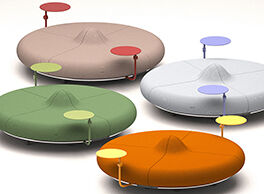
Working in collaboration with BOSS design, second-year students were tasked with exploring and developing innovative products, artefacts or furniture concepts that enhance, improve and better facilitate the future multi-generational workspace, in either the residential office environment, ‘conventional’ onsite office or both.
Students engaged with a variety of discipline-aligned methods including: drawing to explore ideas, model making to varying scales which are appropriate, engaging and researching ergonomics and anthropometrics, as well as, researching ‘real world’ manufacturing processes and techniques utilised within industry.
Communication of ideas visually and verbally, also formed a significant part of this project, with students gaining invaluable employability skills by presenting directly to a client and possible future employer.
Several students participated in alternate weeklong placements with Boss Design. This provides invaluable industry experience and significant personal development opportunities, which undoubtedly helps those students during their final year on the course and after graduation.
Trips and visits
A key element of being a designer is exploring different cultural environments and capturing design inspirations from new sources. BA (Hons) Product Design students can take international study trips to places like New York and Venice. Closer to home, students have visited major design museums and undertaken factory visits to local manufacturers from plastic rotational moulding to aluminium casting and injection moulding processes.
Employability
Enhancing employability skills
The course has a vocational emphasis and is focused on employability. Throughout your study you will engage with real briefs, collaborative opportunities and external industry links. You will develop skills in a broad range of working approaches, from synthesising and applying problem solving and creative thinking skills, to 3D computer modelling, where you will use the latest industry standard software.
Extensive workshops support modelling and prototyping skills, and you will create high-quality outcomes using a wide range of materials, techniques and processes. The course supports personal development as a creative, knowledgeable designer, maximising the potential to obtain positions in national and global companies.
The course develops skills and experience in and around the subject of scales of manufacture, from bespoke, one-off and batch production to standardised mass production. The interdisciplinary nature of design engages relationships across a broad spectrum of specialist areas of study, and we nurture this philosophy through collaborative and professional practice approaches.
Placements
Working with local industry develops professional understanding and creates opportunities for work placements and internships.
In the past, students have worked with interior designers, product designers, furniture manufactures, and design fabricators, including McMaster, HF Contracts, JSC Rotational and Scruffy Dog Design, Create and Deliver.
My internship at Kirkdale Studios during my third year was a great creative experience and helped me to navigate the transition from a student to a working designer. I was given the opportunity to work on live projects, communicate directly with factories, and learn professional skills before even graduating.
Evie Mcginley – Kirkdale Studio
Our Graduates
With industry-linked projects, students have been able to forge links with design and manufacturing companies. From an initial two-week internship with a plastics rotational mouldings company during his second year, product design student Oli Graham went on to become their full-time industrial designer following graduation.
Facilities & Staff

Our Facilities
When you join Birmingham City University, the first thing you will notice is the exceptional quality of our campuses. With an investment of over £400 million across our buildings and facilities, we are committed to giving you the very best learning environment to help shape your experience.
You will be based in our multi-million pound Parkside building – a state of the art facility located within our City Centre Campus. Here you will have full access to our recently upgraded, high spec CAD (Computer-Aided-Design) workstations situated within our dedicated computer labs and open access areas. We also provide access to leading edge digital design software, enabling you to explore technical drawing, graphics, 3D modelling, visualization, animation, computation, simulation, and virtual reality.
The Parkside Building is also home to our digital fabrication labs, where you will be able to explore 3D printing, laser cutting, CNC machining, ceramics, glass and traditional model-making, guided by our team of expert technicians with access to our on-site material store, and professional printing facilities.
You’ll also benefit from:
- Design studios
- Physical and digital library
- Loanable laptops
- Dedicated social spaces
- Cafés
Photo Gallery
From industry-standard software, to our workshops and studio spaces, everything you need will be at your fingertips from day one. Working with our dedicated teaching teams and expert technicians, you'll be supported from concept through to completion.
Making
Workshop facilities are integral to the programme and you will have access to an extensive range of prototyping equipment, including wood machining equipment, metal fabrication, CNC router, four axis milling, waterjet cutting, plaster, ceramic, glass workshops, 3D printing, laser cutting and etching, plastic forming, and ply moulding. A large range of hand and power tools also support model making and prototyping for product and furniture design.
Our staff
Jason Nicholson
Product Design Course Leader
From a career journey beginning in metalsmithing and related products, Jason has a wide experience in various product design sectors – in particular furniture and lighting design. He has taught across a range of specialist courses, focussing and developing ‘making’ as an integral part of the design process. A ‘hands-on’ member of staff with...
More about JasonWayne Pottinger
Product Design Lecturer
Wayne Pottinger is a lecturer and coordinator of the level five (second year) Product Design course. Before joining Birmingham City University Wayne established his own design practice alongside Natalie Cole. Pottinger and Cole’s practice designed and developed products for retail and their objects were stocked in well-respected furniture and...
More about WayneEmma Jones
Product Design Lecturer
Emma is a Lecturer on the BA (Hons) Product Design program, currently teaching across all three levels of the course. Before joining the Faculty of Architecture, Design, and Media as a full-time member of staff in January 2022, she was a Specialist Lecturer in Architecture and Design, delivering 3D design communication modules in industry-leading...
More about Emma







